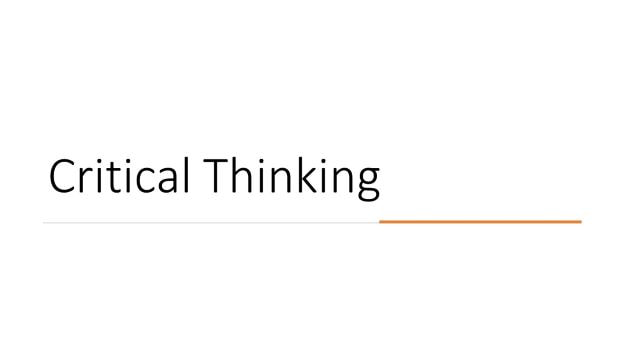In the field of leadership and business management, critical thinking is a critical skill to possess. Developing this skill involves asking and challenging assumptions. Critical thinking helps us to make good decisions, improves our overall performance and the business’s operational excellence & profitability. It is especially important in today's business environment, where people are constantly making decisions and are often under pressure to make them quickly.
Benefits of critical thinking in leadership and business management
Developing critical thinking skills helps leaders analyze their decision-making processes and adopt alternative approaches to address problems. These skills can help a company succeed in the "new normal" of business. While classic leadership strategies remain relevant, they will no longer be sufficient in the face of the challenges of a changing business environment. Instead, today's leaders must learn to think and act differently in order to stay competitive.
Critical thinking can also help employees improve their creative thinking skills. Getting creative often involves pushing conventions and taking risks. Applying a critical approach can help mitigate risks and make creative ideas more useful in the long run. Critical thinking can also help teams reinvent old processes. Moreover, it enhances teamwork and problem-solving skills. It also distinguishes valuable employees in a company.
Critical thinking can also improve emotional intelligence. It helps team members avoid making emotional decisions. It encourages team members to analyze the situation before making any decision. It also helps them weigh the ethical implications of a decision. As a result, they are more likely to come up with creative solutions and ask open-ended questions.
Critical thinking is crucial for effective leadership. It helps leaders identify the right decisions, while also understanding the impact of decisions on the overall organization. It also helps them to align themselves with organizational goals and be accountable for their actions.
Developing critical thinking skills
Questioning is an essential part of critical thinking, as it enables you to evaluate the information that you have. It requires that you continually assess what is relevant and give weight to the most relevant information. This skill can be learned through observation. For instance, you can observe your co-workers during a staff meeting or simply observe everyone and everything around you while waiting at any airport, train station or an out patient department etc.
When questioning, it is imperative to keep the questioning simple and direct. The question should not be too complicated, and it should focus on identifying relationships and principles. It should not be too general or ambiguous because it can lead to long discussions. It is also important to remember that answering a question in a critical way helps you get accurate answers. Remember that the main goal of critical thinking is to identify and evaluate existing knowledge, and to recognize where improvements can be made to a situation.
A critical thinker will be able to analyze information and make accurate decisions. By establishing significance, they will be able to weigh the validity of different data sources. This is important because not all information is equally relevant. Critical thinkers will often challenge assumptions and consider what the underlying motivation of a particular piece of information is.
The ability to question is an important trait for leaders and business managers. Good critical thinkers are able to recognize the strengths and weaknesses of a situation and will ask themselves if their current beliefs will have a positive or negative effect. They will be able to motivate their team members and move them to take action through the use of solid arguments and reasons. As a result, critical thinkers are able to deliver a better performance and offer organizations a distinct advantage over their competition.
Lack of critical thinking in leadership and business management
A recent study identified the need for critical thinking in leaders, with three-quarters of executives predicting that this skill will increase in importance in the near future. Key reasons for this increase include the speed of change in the business landscape, globalization, and increased competitiveness. Leaders must be able to demonstrate that they are capable of using their critical thinking skills to solve complex business problems.
Lack of critical thinking can result in bad decisions, repeated mistakes, and bad assumptions. A leader without these skills can be an unproductive leader and a disaster for the business. A critical thinker is able to identify what the wrong decision is and how to correct it. They can also use a critical lens to identify opportunities that may be overlooked by other people.
The skills of critical thinking can help professionals improve their decision-making skills and make them more confident and efficient. In short, critical thinking helps to uncover alternatives and create new ways of approaching a problem based on accurate data. Without critical thinking, a person can't make effective decisions. Developing these skills is crucial to the success of a business.
Critical thinking requires the creation of a plan to implement a solution. This plan must identify who will implement the solution and how it will be executed. The plan must be flexible enough to adapt to new information. It should also be able to adapt to changes as needed, while keeping the ultimate goal in mind.
You may checkout more about how critical thinking helps in improving organizational excellence in my popular book Leading process improvements with critical thinking.
Related Reading:
- How to cut costs strategically using Kaizen
- Streamline processes and workflows with Gemba Walk.
- Top Ten Strategic Decision-Making Tools for Operational Excellence
- Leading process improvements with emotional intelligence.
Follow Shruti on Twitter, YouTube, LinkedIn
Categories: Strategy | Operations | Leadership
Keywords and Tags:
#criticalthinking #leadershipinnenormal #identifyingbusinessopportunities #leadership #businessmanagement #criticalthinkers #criticalthinkingleaders #processimprovement #operationalexcellence





















